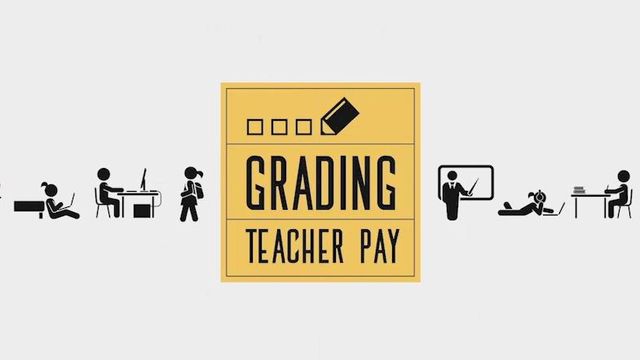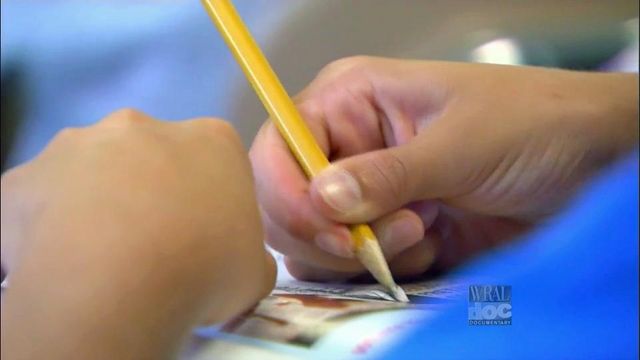After inflation, NC teacher pay has dropped 13% in past 15 years
At the start of his fourth term in 1997, North Carolina Gov. Jim Hunt asked a Republican-controlled House and a Democratic-controlled Senate to raise the state's teacher pay to the national average in four years in an effort to attract and retain more teachers.
Posted — UpdatedBy the time Hunt left office, North Carolina had risen in the national rankings and moved closer to the country's average teacher salary. During the 2001-02 school year, the state ranked 19th in the U.S. for average teacher pay, less than $2,000 from the then-national average of $44,655, according to the National Center for Education Statistics.
But in the years since Hunt left the governor's mansion, the state's ranking has plummeted. In 2013-14, North Carolina hit its lowest rank in more than a decade – 47th in the nation, with teachers paid nearly $12,000 below the national average of $56,610.
When adjusted for inflation, North Carolina's average teacher salary has dropped more than 13 percent since 1999, according to the National Center for Education Statistics. The U.S. average teacher salary has dropped 1.8 percent in that same timeframe.
“In my opinion, paying teachers more, getting to the national average, ought to be the top priority in the budget of North Carolina," he said. "We ought to start it right now and stay committed to it over a period of years."
But how much to increase teacher pay, if at all, is a perennial budget issue North Carolina governors and lawmakers face. In the 15 years since Hunt left office, North Carolina teachers have seen average salary increases anywhere from 0 percent to more than 8 percent. At times, they have had pay freezes, no step increases and bonuses of varying amounts.
{{/a}}
The topic of teacher pay has been especially high profile this election year with the current governor and state superintendent – both of whom are seeking re-election – touting their ideas for how much to pay teachers. And legislative leaders, some of whom are also up for re-election, are back in Raleigh this week to begin the short session, where teacher pay will be on the agenda.
Whatever happens, Hunt will be watching.
"If you care about the future, if you care about your own children, your own family, this ought to be the number one thing we think about and work on and vote on in North Carolina," he said.
Superintendent: Teachers 'did not take a vow of poverty'
Where teacher pay will end up this year is still unknown. Lawmakers and education leaders who have spoken publicly about the topic have called for raises anywhere from 2 percent to the double digits. Pay freezes of the past don't appear to be an option anyone is considering.
{{/a}}
"The teacher in the classroom is the most important person, outside of a family member, in our children's lives," Atkinson said. "Our teachers have not gotten into education to become millionaires, yet they did not take a vow of poverty either."
North Carolina ranks 10th out of 12 states in the Southeast, according to the latest data. The state would need to increase average teacher pay by 12 percent to take the No. 1 spot from Georgia.
While average teacher pay rankings are one way to compare North Carolina to the rest of the country, education leaders say those numbers don't tell the whole story.
Alexis Schauss, director of school business for the state Department of Public Instruction, says average teacher pay does not take into account the experience level of teachers in different states. When North Carolina's average teacher pay went down in previous years, it wasn't because teachers were paid less. The population just became less experienced.
"We lost a significant number of 25-plus-year teachers," Schauss said.
"Stick with salary schedules. That’s recruiting power," Schauss said.
Recruiting is a concern, especially in high-need areas such as math, science and middle grades, according to state education leaders.
The state superintendent says increasing teacher pay could entice more college students to become teachers and help retain teachers who are already in the classroom.
"Many of our elected officials, including our governor, recognize that we need to be at a better place than we are now," Atkinson said.
{{/a}}
Governor proposes teacher pay boost
Under current Gov. Pat McCrory, North Carolina's average teacher salary and ranking have improved – from $44,990 in 2013-14 to $47,783 last school year, moving the state from 47th to 42nd in the nation. But education leaders have called for him to do more.
Although the teaching profession has benefited from raises the past two years, permanent increases have been largely tilted toward early career teachers as lawmakers and McCrory raised the minimum base salary to $35,000. That's led to complaints that veteran teachers have been left out.
McCrory says his latest budget proposal would provide a 3.5 percent average bonus to teachers and principals, "with a greater share going to veteran teachers. This will equate to a $5,000 bonus for our veteran teachers with more than 24 years of service."
Sen. Jerry Tillman, R-Randolph, an education budget writer, said "a lot is going to depend on what the revenue looks like. I feel like we will (offer) something significant for teachers if the money's there."
Both Tillman and Rep. Craig Horn, R-Union, a House education budget writer, said they want to keep pressing for ways to give higher pay to educators who teach in hard-to-staff schools or subjects. McCrory's proposal didn't address differentiated pay, but his spokesman said the governor hasn't given up on that concept.
Raleigh teacher: NC 'doesn't care that much' about us
{{/a}}
“North Carolina just doesn’t care that much about, about their teachers," she said. "Our value isn’t seen by others ... In society, sometimes teachers aren’t seen as professionals. Sometimes we’re seen as babysitters.”
The state puts a value of $36,500 a year on Hairston's career. Wake County adds about another $6,400 in supplemental pay, bringing her total annual salary to just under $43,000 a year. Hairston says she has a friend who makes just as much money answering phones, and her other college-educated peers are doing far better, too.
Hairston's salary is well below Wake County's median household income of nearly $67,000. She is the only member of her household but she says she still has to budget carefully to make ends meet.
“I didn’t get into teaching for the pay. I got into teaching because I love what I do and I knew I wanted to make a difference in the world," she said. "(But) you do have to think about pay. Yes, money isn’t everything, but you have to survive and you want to enjoy your life as well.”
The WRAL Documentary team shadowed Hairston at Athens Drive High recently, where she says she often works 50 or more hours a week. Although she sometimes feels stressed taking on so many roles – "I’m a nurse. I’m a teacher. I’m a pseudo parent" – Hairston says she couldn't see herself doing anything else.
On the day WRAL visited, Hairston planned to spend the first half of her lunch break catching up on emails while eating. Instead, she had to help break up a fight between two students and then quickly eat her lunch as she walked to the cafeteria to serve as lunchroom monitor.
“I don’t dread going to work, because I love my kids so much and I love what I’m doing for society, and I know I’m doing something to help somebody’s life," she said.
As a Wake County Public School System teacher, Hairston receives one of the highest teacher pay supplements in the state.
Teacher salaries in North Carolina are paid both by the state government and, in many counties, by a local supplement. Wake County schools paid nearly $7,000, on average, to its teachers this school year. The exact amount is determined by how many years a teacher has been employed and whether they have a bachelor's or master's degree.
Durham Public Schools paid the second highest average supplement in the state this school year, nearly $6,800, followed by Charlotte-Mecklenburg Schools, which also paid nearly $6,800.
Seven school systems did not pay their teachers any supplement this school year.
Teacher turnover and the problem with 'churn'
Houck says investing in teacher salaries helps solve the problem of constantly trying to find and hire teachers to replace ones who’ve left.
Even though it’s difficult to make a direct connection between teacher salaries and student test scores, Houck says business models in other sectors and in the non-profit and for-profit sectors "already acknowledge that salary is an important part of a comprehensive human resources package that helps people stay in their jobs and feel successful in doing them."
North Carolina’s teacher pay ranking also hurts the state’s reputation in the eyes of businesses looking to locate here, he says.
"One of the things that we know that groups look at is the quality of their education system in a state, and the quality of the education system is often proxied by this ranking," Houck said.
{{/a}}
Rep. Nelson Dollar, R-Wake, chairman of the House Appropriations Committee, blames the state’s decline in teacher salary ranking on several factors, including the recession.
"The Democrats who were in charge at the time cut a billion dollars out of education. I’m sure they would argue that was out of necessity," he said.
Dollar says it was necessary to continue some cutting after Republicans took control of the legislature in 2013. They cut teaching assistant positions, bonuses for earning masters degrees and froze teacher salaries. The cuts sparked protests.
In 2015, the legislature raised entry-level salaries for teachers from about $31,000 to $35,000.
"We put our money there, first, to frankly retain those high-quality, younger teachers that we want to stay in the system for the next 20 years," Dollar said.
Former teacher: NC 'is driving excellent people away'
{{/a}}
However much the legislature decides to increase teacher pay this year, it will be too little, too late for former teacher Jennifer Lowery, a 17-year veteran of Charlotte Mecklenburg Schools.
Lowery says it has been hard to watch North Carolina’s average teacher pay ranking drop over the years. She also struggled with long hours, sometimes 60 to 65 hours a week, and an increasing workload as positions were cut.
In December, Lowery told her students she was leaving.
"Across America they'll be talking about, 'Look at what's happened in North Carolina. They're back on track. They are really going places in terms of education and their schools,'" Hunt said.
• Credits
Copyright 2024 by WRAL.com and the Associated Press. All rights reserved. This material may not be published, broadcast, rewritten or redistributed.






